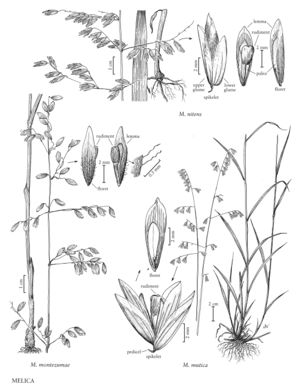Difference between revisions of "Melica nitens"
FNA>Volume Importer |
FNA>Volume Importer |
||
| Line 17: | Line 17: | ||
-->{{Treatment/Body | -->{{Treatment/Body | ||
|distribution=Wis.;W.Va.;N.Mex.;Tex.;N.C.;Tenn.;Pa.;Va.;Colo.;Md.;Ala.;Ark.;Ill.;Ga.;Ind.;Iowa;Ariz.;Kans.;Nebr.;Okla.;Ohio;Mo.;Minn.;Ky. | |distribution=Wis.;W.Va.;N.Mex.;Tex.;N.C.;Tenn.;Pa.;Va.;Colo.;Md.;Ala.;Ark.;Ill.;Ga.;Ind.;Iowa;Ariz.;Kans.;Nebr.;Okla.;Ohio;Mo.;Minn.;Ky. | ||
| − | |discussion=<p | + | |discussion=<p>Melica nitens grows in dry to moist woodlands, often in rocky areas with rich soil. It grows primarily from Minnesota to Pennsylvania and southwest to Texas.</p> |
|tables= | |tables= | ||
|references= | |references= | ||
| Line 33: | Line 33: | ||
|basionyms= | |basionyms= | ||
|family=Poaceae | |family=Poaceae | ||
| + | |illustrator=Linda A. Vorobik | ||
|distribution=Wis.;W.Va.;N.Mex.;Tex.;N.C.;Tenn.;Pa.;Va.;Colo.;Md.;Ala.;Ark.;Ill.;Ga.;Ind.;Iowa;Ariz.;Kans.;Nebr.;Okla.;Ohio;Mo.;Minn.;Ky. | |distribution=Wis.;W.Va.;N.Mex.;Tex.;N.C.;Tenn.;Pa.;Va.;Colo.;Md.;Ala.;Ark.;Ill.;Ga.;Ind.;Iowa;Ariz.;Kans.;Nebr.;Okla.;Ohio;Mo.;Minn.;Ky. | ||
|reference=None | |reference=None | ||
| Line 38: | Line 39: | ||
|publication year= | |publication year= | ||
|special status= | |special status= | ||
| − | |source xml=https:// | + | |source xml=https://bibilujan@bitbucket.org/aafc-mbb/fna-data-curation.git/src/314eb390f968962f596ae85f506b4b3db8683b1b/coarse_grained_fna_xml/V24/V24_128.xml |
|subfamily=Poaceae subfam. Pooideae | |subfamily=Poaceae subfam. Pooideae | ||
|tribe=Poaceae tribe Meliceae | |tribe=Poaceae tribe Meliceae | ||
Revision as of 16:05, 30 October 2019
Plants not or loosely cespitose, shortly rhizomatous. Culms 55-130 cm, not forming corms; internodes smooth. Sheaths glabrous or scabridulous; ligules 1-6.5 mm; blades 3.5-11 mm wide, flat, abaxial surfaces smooth or scabridulous, adaxial surfaces scabridulous. Panicles 9-26 cm; branches 3.5-6 cm, often divergent to reflexed, straight, with 5-20 spikelets; pedicels sharply bent and hairy below the spikelets; disarticulation below the glumes. Spikelets 8-12 mm, with 2-3(4) bisexual florets, apices of the lowest 2 florets not at the same level; rachilla internodes 2.3-2.4 mm. Glumes unequal; lower glumes 5-9 mm long, 3.5-4.5 mm wide, more ovate than the upper glumes, 3-9-veined; upper glumes 6-11 mm long, 2.5-3.5 mm wide, 3-7-veined; lemmas 6.5-11.5 mm, glabrous or scabrous, somewhat indurate, with 9+ veins, veins prominent, apices rounded, unawned; paleas about 3/4 the length of the lemmas; anthers 1.7-3.2 mm; rudiments 2-3 mm, clublike, not resembling the bisexual florets, in a straight line with the rachilla. 2n = 18.
Distribution
Wis., W.Va., N.Mex., Tex., N.C., Tenn., Pa., Va., Colo., Md., Ala., Ark., Ill., Ga., Ind., Iowa, Ariz., Kans., Nebr., Okla., Ohio, Mo., Minn., Ky.
Discussion
Melica nitens grows in dry to moist woodlands, often in rocky areas with rich soil. It grows primarily from Minnesota to Pennsylvania and southwest to Texas.
Selected References
None.
